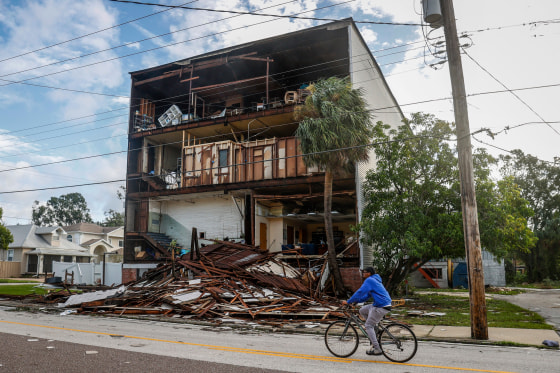Puerto Ricans who survived Hurricane Maria seven years ago and are now living in Florida are not only grappling with the aftermath of Milton, but they are also coping with the emotions that come when reminded of one of the deadliest and most devastating tragedies.
"It was honestly one of the most traumatizing experiences of my life," Cecilia Rosa De Leon, who lives in the Orlando metropolitan area, said about Maria.
De Leon, 26, went about an hour east of her home in Apopka on Wednesday to ride out Milton with some of her relatives. They boarded up the windows of the house and placed pool foams under doors and garage to prevent water from seeping in. They also stocked on enough nonperishable food to last four days and got flashlights to endure a power outage.
"It's pretty scary," De Leon said, "because we never know what's going to happen." Her caution and her efforts to prepare for the worst were informed by her experience surviving Maria in 2017, which was a Category 4 hurricane.
De Leon was in Puerto Rico living with her father and stepmother in a house in the mountainous part of the town of Canóvanas when Maria hit. The windows burst during the storm, flooding the home with 2 to 3 feet of water, De Leon recalled. Her family used some home tools to quickly repair the windows, hoping it would curb the flooding, and held down the doors until the storm ended to prevent strong winds from flattening the house.
In retrospect, De Leon said, the biggest mistake she made back then was underestimating the intensity of the storm, which left her underprepared to face Maria's unprecedented aftermath. Her family was left without enough food, no way to communicate and no power. After Maria hit, when they left the house to assess the damage, they saw that some of their neighbors hadn't survived the hurricane.
"They had died. One of them was an elderly couple. The roof fell on them while they were sleeping. It was just very emotional. After Maria, that's where I really had respect for what a hurricane really is and the importance of being prepared," De Leon said.
The aftermath of Maria claimed the lives of almost 3,000 people in the U.S. territory, becoming the deadliest hurricane in the U.S. in 100 years. A research team led by Harvard University estimated that one-third died after Maria hit because of delayed or interrupted medical care, largely due to the long blackout.
Milton made landfall as a Category 3 storm at 8:30 p.m. Wednesday near Siesta Key, Florida, a barrier island next to Sarasota. As of Thursday afternoon, at least nine people have been confirmed killed in the storm’s aftermath. More than 3.3 million energy customers in the state also lacked electricity, according to poweroutage.us.
“It feels like Maria part 2. It’s horrible,” said Shailier Figueroa as she hunkered down with relatives near Kissimmee and awaited Milton to make landfall Wednesday.
"You could see the panic since Sunday," she said, when people were standing in long lines to get gas and food pantries started to empty out. But Figueroa, 30, has been stocking on supplies since August — right before hurricane season starts to intensify. It became a habit after she found herself lacking necessary supplies in the wake of Maria, Figueroa said.
Figueroa was one of more than 100,000 Puerto Ricans who left Puerto Rico during Maria's aftermath. While many eventually returned to the island, thousands relocated to states like Florida — seeking safety, economic opportunities and a place to rebuild their lives.
For 22-year-old Jesús Eduardo Aponte Feliciano, facing Milton was intimidating since it was the first time grappling with a hurricane as an adult.
"It was harder now because I'm on my own in Florida," said Aponte Feliciano, who works as a lifeguard in Orlando. "I could have gone to Philadelphia or Georgia to be with family, but I decided to stay here because I need to work and people always need help after a hurricane."
Aponte Feliciano was just a teenager when he survived Maria in Puerto Rico. The memories of losing his grandmother in the aftermath, living without power for more than a month, lacking running water at home and biking to get clean water raced through his mind this week. But keeping him calm is all the efforts he made to have enough supplies to last him a week and remaining in his apartment with his roommates.
"Hurricane Maria changed our lives and I think that we will never underestimate any hurricane or natural disaster," Aponte Feliciano said in Spanish. "We will prepare for a Category 1 as if it was a Category 5."

